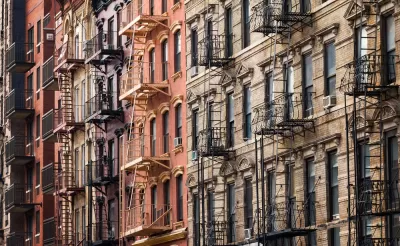Some evidence suggests that apartments lead to more greenhouse gas emissions per capita than houses. Does this mean that suburbs pollute less than cities? Probably not.

A couple of months ago, I criticized the notion that suburban sprawl actually improves air quality by reducing density. However, I missed one pro-sprawl argument: the claim, based on an Australian study [pdf], that apartments (especially high-rise apartments) have higher per-capita greenhouse gas (GHG) emissions than houses. Does this study mean that sprawl pollutes less than compact development? Probably not, for several reasons.
First, walkable urban development need not require high-rise apartment buildings. In fact, low-rise urban areas can be quite dense. For example, Brooklyn's Park Slope neighborhood is dominated by rowhouses and other low-rise buildings- so much so that only 15 percent of its housing structure have five or more units. Yet Park Slope has just over 64,000 people per square mile (roughly twice the Brooklyn-wide average), and the overwhelming majority of its residents do not drive to work.
Second, the Australian study may be of limited uses because of its miniscule sample size. It studied only 17 high-rise buildings, 12 mid-rise buildings and 10 low-rise buildings. As a result, the authors wrote that their study’s results "are not statistically representative of… multi-unit residential buildings" even in Sydney, Australia where the study was conducted, let alone in the United States.
Third, evidence from Australia may not be tremendously relevant to the United States, because personal vehicles account for only 10 percent of Australian GHG emissions, as opposed to 25 percent of U.S. GHG emissions. As a result, development patterns that reduce driving are likely to reduce overall per-household emissions to a greater extent in the United States than in Australia.
Fourth, because the study focuses on per-capita emissions its findings are only valid as long as household sizes do not change—that is, as long as apartments are more likely than houses to be dominated by single people. But if development becomes more compact and multifamily dwellings become more popular with families, per-capita emissions for apartments will decline, because each new resident does not significantly increase the overall emissions for a unit. For example, if a two-bedroom apartment is occupied by a family of three instead of by one person, their apartment building is unlikely to need additional elevators or hallway lighting.

Maui's Vacation Rental Debate Turns Ugly
Verbal attacks, misinformation campaigns and fistfights plague a high-stakes debate to convert thousands of vacation rentals into long-term housing.

Planetizen Federal Action Tracker
A weekly monitor of how Trump’s orders and actions are impacting planners and planning in America.

San Francisco Suspends Traffic Calming Amidst Record Deaths
Citing “a challenging fiscal landscape,” the city will cease the program on the heels of 42 traffic deaths, including 24 pedestrians.

Defunct Pittsburgh Power Plant to Become Residential Tower
A decommissioned steam heat plant will be redeveloped into almost 100 affordable housing units.

Trump Prompts Restructuring of Transportation Research Board in “Unprecedented Overreach”
The TRB has eliminated more than half of its committees including those focused on climate, equity, and cities.

Amtrak Rolls Out New Orleans to Alabama “Mardi Gras” Train
The new service will operate morning and evening departures between Mobile and New Orleans.
Urban Design for Planners 1: Software Tools
This six-course series explores essential urban design concepts using open source software and equips planners with the tools they need to participate fully in the urban design process.
Planning for Universal Design
Learn the tools for implementing Universal Design in planning regulations.
Heyer Gruel & Associates PA
JM Goldson LLC
Custer County Colorado
City of Camden Redevelopment Agency
City of Astoria
Transportation Research & Education Center (TREC) at Portland State University
Jefferson Parish Government
Camden Redevelopment Agency
City of Claremont






























